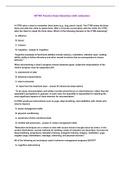TRC Study guides, Class notes & Summaries
Looking for the best study guides, study notes and summaries about TRC? On this page you'll find 1038 study documents about TRC.
Page 3 out of 1.038 results
Sort by
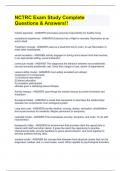
-
NCTRC Exam Study Complete Questions & Answers!!
- Exam (elaborations) • 45 pages • 2024
- Available in package deal
-
- $14.99
- + learn more
holistic approach - ANSWER Advocates personal responsibility for healthy living recreational experience - ANSWER Everyone has a Right to recreate. Recreation as an end to itself Treatment concept - ANSWER used as a treatment tool to cure> to use Recreation to meet other needs/goals. social recreation - ANSWER activity engaged in during one's leisure time that involves, in an appropriate setting, social interaction continuum model - ANSWER This diagnoses the behavior between non-p...
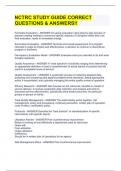
-
NCTRC STUDY GUIDE CORRECT QUESTIONS & ANSWERS!!
- Exam (elaborations) • 77 pages • 2024
- Available in package deal
-
- $12.39
- + learn more
Formative Evaluation - ANSWER On-going evaluation using step-by-step process of decision making relating to numerous specific aspects of a program rather than one final evaluation, leads to immediate change. Summative Evaluation - ANSWER Terminal and overall assessment of a program intended to judge its impact and effectiveness, a decision to continue or discontinue program is imminent. Discrepancy Evaluation Model - ANSWER Evaluates what you intended to do and what actually happened Qu...
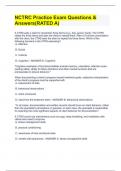
-
NCTRC Practice Exam Questions & Answers(RATED A)
- Exam (elaborations) • 31 pages • 2024
- Available in package deal
-
- $12.99
- + learn more
A CTRS asks a client to remember three items (e.g., dog, pencil, book). The CTRS states the three items and asks the client to repeat them. After a 5-minute conversation with the client, the CTRS asks the client to repeat the three items. Which of the following domains is the CTRS assessing? A. Affective B. Social C. Cultural D. Cognitive - ANSWER D. Cognitive "Cognitive examples of functional abilities include memory, orientation, attention span, reading ability, ability t...
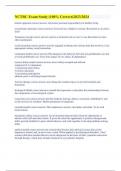
-
NCTRC Exam Study (100% Correct)2023/2024
- Exam (elaborations) • 43 pages • 2024
- Available in package deal
-
- $8.49
- + learn more
holistic approach correct answers Advocates personal responsibility for healthy living recreational experience correct answers Everyone has a Right to recreate. Recreation as an end to itself Treatment concept correct answers used as a treatment tool to cure> to use Recreation to meet other needs/goals. social recreation correct answers activity engaged in during one's leisure time that involves, in an appropriate setting, social interaction continuum model correct answers This diagno...
NCTRC PACKAGED EXAMS WITH PRACTICE QUESTIONS AND ANSWERS ...
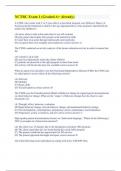
-
NCTRC Exam 1 (Graded A+ Already)
- Exam (elaborations) • 26 pages • 2024
-
- $9.99
- + learn more
A CTRS, who works with 3- to 5-year-olds in a preschool program, uses Erikson's Theory of Psychosocial Development to improve the age-appropriateness of his programs. Specifically he teaches the children to (A) know when to take action and when to use self-restraint (B) play games that require intra-group social interaction skills (C) meet their own needs through intrinsically motivated play (D) recognize their own strengths and weaknesses correct answers A The CTRS conducted an activity...
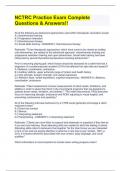
-
NCTRC Practice Exam Complete Questions & Answers!!
- Exam (elaborations) • 23 pages • 2024
- Available in package deal
-
- $14.49
- + learn more
All of the following are behavioral approaches used within therapeutic recreation except A.) Assertiveness training B.) Progression relaxation C.) Reminiscence therapy D.) Social skills training - ANSWER C. Reminiscence therapy Rationale: "Three therapeutic approaches, which have come to be viewed as entities unto themselves, are related to the behavioral approach. Assertiveness training and progressive relaxation training rest upon behaviorism. Social skills training has been influenced...
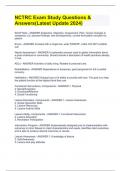
-
NCTRC Exam Study Questions & Answers(Latest Update 2024)
- Exam (elaborations) • 26 pages • 2024
- Available in package deal
-
- $12.99
- + learn more
SOAP Note - ANSWER Subjective, Objective, Assessment, Plan. Covers changes in symptoms, c/o, physical findings, new developments, current formulation and plan for patient. Errors - ANSWER Crossed with a single line, write "ERROR", initial. DO NOT scribble out! Needs Assessment - ANSWER A systematic process used to gather information about a given individual or community. Should include a description of health practices already in use. ADLs - ANSWER Activities of daily living. Related ...

-
NCTRC Exam book questions and Answers
- Exam (elaborations) • 30 pages • 2024
- Available in package deal
-
- $12.99
- + learn more
NCTRC Exam book questions and AnswersThe CTRS wants clients with severe intellectual disability to be able to freely choose their preferred leisure experiences. When the CTRS uses a variety of tactile, auditory, and gustatory objects from which the client chooses, it is called ____________. A) reality orientation B) remotivation C) assertiveness D) sensory stimulation - ANSWER D Visualization can be helpful to clients because they can A) use imaginary practice sessions for upcoming stres...
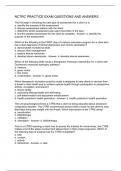
-
NCTRC Practice Exam Q&A
- Exam (elaborations) • 15 pages • 2023
-
- $12.49
- + learn more
The first step in choosing the best type of assessment for a client is to a. identify the purpose of the assessment b. discuss assessment options with the client c. determine which assessment was used most often in the past d. find the easiest assessment for the client to complete - Answer- a. identify the purpose of the assessment Which of the following is the FIRST step of a leisure education program for a client who has a dual diagnosis of clinical depression and chronic alcoholism? a...

That summary you just bought made someone very happy. Also get paid weekly? Sell your study resources on Stuvia! Discover all about earning on Stuvia

